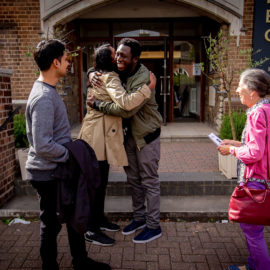Word for the Week
Short reflections on Bible passages, with a frontline focus...
Read
Though we are slaves, our God has not forsaken us in our bondage. He has shown us kindness in the sight of the kings of Persia: he has granted us new life to rebuild the house of our God and repair its ruins, and he has given us a wall of protection in Judah and Jerusalem. But now, our God, what can we say after this? For we have forsaken the commands you gave through your servants the prophets…
Ezra 9:9–11
—
If the book of Ezra was just about ‘getting back in the building’, it would end with chapter 6.
In spite of setbacks and opposition along the way, God’s people have persevered. The temple has been rebuilt and dedicated. Even so, it’s not just a ‘bricks and mortar’ moment. It’s about reconnecting with the past, reclaiming their identity, and remembering God’s salvation. No wonder we read that ‘the LORD had filled them with joy’ (6:22). In truth, it would be a great place to finish the story.
But there’s more. There always is.
Ezra knew what many churches have discovered: once the building project is over, the real work starts.
Renewed worship is to lead to renewed lifestyle. But the people had lost touch with how God had called them to live. The very issues which had taken them into exile in the first place now threatened to undo them and their witness to the nations all over again. They were not only abandoning their obligations to be a distinctive people, they were also jeopardising the blessing that was designed to come through them to others.
So it is that Ezra prays.
The prayer provides a poignant window into Ezra’s heart. It’s a deeply emotional outpouring of grief to the Lord, highlighting the people’s unfaithfulness, all too aware that he stands in solidarity with them. There’s a full acknowledgement of guilt and a recognition that they have placed themselves under the searching gaze of God.
But the prayer is addressed throughout to ‘our God’. And this is the only hope for the restoration they need. Even when they stop living like his people, he will not stop loving like their God. God has ‘shown kindness’ – covenant loyalty – to them. Ezra knows that this covenant God ‘has not forsaken’ them, and that his grace is already seen in the events which have brought about their return, giving them ‘new life’.
It’s perhaps a prayer to take with us as we continue to emerge out of lockdown, whatever that might look like over the next season.
We move forward recognising that our celebrations of regathering are nothing without our relationship with God being in place. And we do so confident in God’s character and commitment to us, that his love is designed to bring us to a place of service, and that our future is based solely on who he is.
Antony Billington
Theology Advisor, LICC
How does our confidence in the covenant God make a difference to how we pray for ourselves and others on our frontlines? Join the conversation in the comments below.

Thanks Antony, a really encouraging piece. I do love the inclusive ‘our’ language in his prayer – a whole community called together to service … where the rebuilding sets them up to be a light to the nations, never an end in and of itself.
Regarding your question: ‘How does our confidence in the covenant God make a difference to how we pray for ourselves and others on our frontlines?’ … I thnk it removes anxiety in my prayers … as though it all depends on me, rising or falling on my competence, wisdom, even character. But my confidence is in God being jealous for the glory of his name, shaping a people to bear witness wherever they go … and it also challenges my temptation to only pray about issues facing the church gathered in our buildings, instead seeing this as a tool for our scattering to bless our neighbours who are unlikely to ever join us in a religious service. Certainly a challenge, but it gives me peace praying from this place, centred on our covenant God and his promises to make all things new.
Dear Antony, thank you for advancing the theme of being a distinctive people. This line speaks to me: “Renewed worship is to lead to renewed lifestyle…how God had called them to live.” I live in New Hampshire, the least religious state in the US with an average Protestant attendance of less than 40 members. If business leaders are already claiming “we can’t go back to doing things pre-COVID,” where will renewed worship and renewed lifestyle come from post-lockdown? I confess my fear that organized Church has lost its relevance amid NextGen society. I haven’t stepped foot in a church in 15 months. Instead, I avail myself to wonderful content from LICC, regularly view a weekly church sermon on TV, and regularly attend online worship from my brother’s church in Michigan. I tithe to Young Life believing that youth are the Church’s future. My frontline is my workplace (albeit remotely) and I am intentional about my discipleship in this arena. I may be wrong for thinking this way, but I feel like the digital age opens renewed worship and renewed lifestyle outside of the stale model of organized denominations.